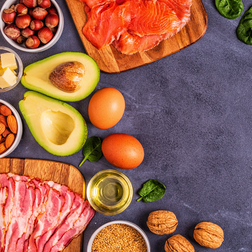|
Choosing the wrong foods can lead to an array of negative consequences that impacts our endocrine function. For example, sugar interferes with every process in our body, from head to toe. Consuming too much wreaks havoc on the body’s blood sugar levels, insulin levels and can damage the pancreas. Sugar also damages our brain, which is one of the major controllers of the endocrine system.
In addition to this the majority of processed foods contain chemicals that act similarly to the body’s hormones; this confuses the body and makes it difficult for the body’s real hormones to carry out their functions. Fats are the building blocks for many hormones and are a necessary part of your diet, but unhealthy fats (i.e., corn, cottonseed, soy, rapeseed, safflower, “vegetable” oils) can cause impaired endocrine function. In order for our body to create hormones (with the optimal balance), we need to provide it with the right building blocks. These building blocks start with the food that we eat. Like I mentioned above, this mainly comes from quality fats, and protein. Examples of quality fats that are going to support the endocrine function include omega-3s from fish such as salmon (or cod liver oil supplementation), animal fats and eggs from healthy animals, and fruit oils such as coconut, olive, and avocado oil. In terms of protein, animal protein is where we see the best return on investment. As Chris Kresser, M.S. L.Ac., states, “Animal proteins are, in almost every case, superior to plant proteins”. This is due to the bioavailability of amino acids from the protein in each of these foods. Bioavailability refers to how much of something our body can actually absorb and use. A common scale used by scientists to measure this is called the called the Digestible Indispensable Amino Acid Score (DIAAS). The higher the score the more bioavailable a food is. For example, eggs are 1.13, beef rings in 1.10, and chickpeas are 0.83. This is important because amino acids, which are the building blocks of protein, are also building blocks of hormones. So, when planning meals, I always recommend using animal protein as the base, not only for the amino acids, but also for other nutrients that will support endocrine function, including magnesium, B vitamins, and zinc. Avoiding a high carb meal or snack by focusing on protein, will also help to keep blood sugar balanced, which we know has a negative effect on our hormones. Following protein, focus on healthy fats and then add in vegetables like cooked cruciferous veggies like broccoli, cauliflower and brussels sprouts, greens such as sautéed spinach, or anti-inflammatory foods/spices like garlic, ginger or turmeric. While foods may not be able to fix everything, diet is one of the simplest and best places to start when we’re facing any kind of health issue or challenge. By focusing on the foods we consume, we can begin to really listen to our body. Once we are able to hear what our body is telling us, we can then learn what works best for us! After all, we are all unique, and what makes one person thrive, may make someone else sick. Therefore, understanding and accepting ourselves for the truly amazing individuals we ALL are is key in thriving and living life to the fullest!
0 Comments
Leave a Reply. |
Archives
December 2023
This website uses marketing and tracking technologies. Opting out of this will opt you out of all cookies, except for those needed to run the website. Note that some products may not work as well without tracking cookies. Opt Out of Cookies |
|
© 2023 Rachel Murray Holistic Nutrition
|

